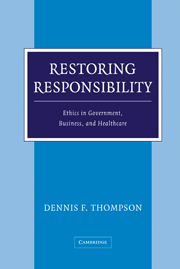Introduction: The Need for Institutional Responsibility
Published online by Cambridge University Press: 29 January 2010
Summary
Ethics scandals have proliferated in the worlds of government, business, medicine, and on the sites of many other professions, even the clergy. In the United States more members of Congress have been investigated and sanctioned for misconduct in recent decades than in all of its previous 200-year history. Some 500 officials in the executive branch have been charged with misconduct since 1970. The top executives of Enron, once the world's seventh largest corporation, perpetrated fraudulent schemes that brought about the company's collapse in 2001. The ensuing inquiries exposed ethical failures in other corporations and in the institutions that are supposed to oversee them. Accountants, lawyers, bankers, security analysts, and brokers were implicated. The Catholic Church in the United States has yet to recover from the most devastating scandal in its modern history – the failure to deal early and properly with the hundreds of priests who abused young children. Less dramatic but no less significant lapses occurred in the healthcare system, philanthropic organizations, universities, the legal profession, and the media.
Are public officials, corporate executives, and other leaders becoming more corrupt? Are we in the midst of a “corruption crisis” as some have declared? There is no good reason to believe that our leaders in general are more corrupt than they used to be. In some respects, they may be less corrupt. Conduct that was widely ignored in previous eras (petty graft, nepotism, payola, drunkenness, and physical violence in Congress) would be grounds for prosecution today.
- Type
- Chapter
- Information
- Restoring ResponsibilityEthics in Government, Business, and Healthcare, pp. 1 - 8Publisher: Cambridge University PressPrint publication year: 2004



